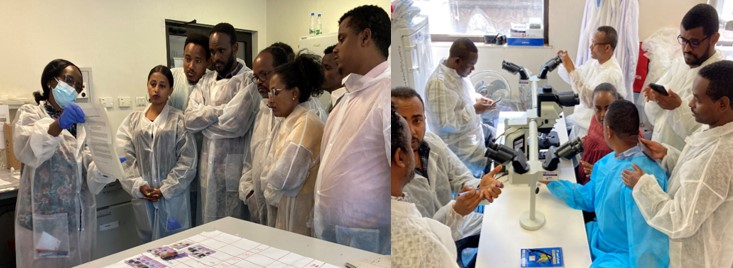
The IHR Strengthening Project laboratory team in collaboration with Ethiopian Public Health Institute (EPHI) delivered two-rounds of Malaria Laboratory Diagnosis and Quality Assurance “Training of Trainers” from 15th-27th February 2023.
Ethiopia is among a few countries in the horn of Africa where malaria is endemic, with 75% of the land mass being malarial. For unknown reasons, Ethiopia is facing a malaria resurgence (epidemic) outside its typical seasonal peaks of September to December and June to August. Accurate and prompt diagnosis of malaria cases is key to the control and elimination of malaria. Poor diagnostic performance, low parasite density, and the coexistence of different malarial species in the country hinder the progress toward malaria elimination program.
This training was requested by EPHI to improve the number and performance of laboratory personnel in the detection and identification of malarial parasites and to achieve the malaria elimination goal.

A total of 52 laboratory professionals from universities, EPHI, regional laboratories, and hospital laboratories participated in the training. The second-round training was officially opened by Dr. Anne Wilson, Head of IHR Strengthening Project and Sajil Liaqat, Country lead for the IHR Strengthening Project in Ethiopia.
The training comprised an overview of malaria, laboratory procedures, quality assurance, laboratory safety, supply management and hands on practice in malaria parasite detection, and hands-on species identification in the laboratory. Pre-skill assessment was conducted on smear preparation, fixation, malaria parasite detection, species identification and parasite quantification.

Based on the identified gaps, slide presentations, hands on practice in the laboratory on smear preparation, malaria parasite detection, species identification and quantification were provided to participants by WHO certified malaria microscopists.

This professional training on malaria microscopic diagnosis has a significant performance improvement of the trainees in their detection and species identification of malaria parasites as indicated in the pre and post-training assessment. Participants also gave feedback that they acquired essential knowledge and developed practical skills in malaria microscopic diagnosis and quality assurance.
Many thanks to EPHI and Adama Regional Laboratory trainers for providing and facilitating this training and we looking forward to future collaboration.
By Hiwot Hailu